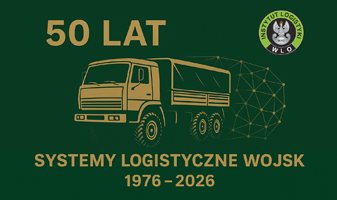Current issue
Archive
About the Journal
Aim and scope
International Scientific Council
Contact
Editorial Office
Reviewers
List of reviewers in particular years
Reviewing and publication process
Publishing ethics
Open Access Policy
Procedure securing the originality of the publication
Publisher
For authors
ORIGINAL PAPER
TACTICAL DECISIONS OF COMPANIES IN THE SCOPE OF DETERMINING TERMS OF DISTRIBUTION OF GOODS
1
Wojskowa Akademia Techniczna, Wydział Bezpieczeństwa, Logistyki i Zarządzania, Instytut Logistyki
2
Wojskowa Akademia Techniczna, Wydział Logistyki, Instytut Llogistyki
Publication date: 2018-11-02
SLW 2018;49(2):112-123
ABSTRACT
The aim of this article is to present the impact of variables in the form of delivery dates (so-called time windows of deliveries) on the financial result in transport and decisions of managers in creating terms of cooperation with clients. These variables are transferred to information systems that deal with automatic route optimization and build transport plans. A simulation study was carried out to compare the generated financial result in terms of cost, quality and the amount of used fleet for the distribution of goods using calculations taking into account the delivery time windows and after their removal. Such a visualized plan can be a material for making strategic or tactical decisions by managers in logistics companies
REFERENCES (14)
1.
Agra A., Christiansen M., Figueiredo R., Hvattum LM., Poss M., Requejo C., The robust vehicle routing problem with time windows. Computers & Operations Research, 2013, nr 40, s. 856–866.
2.
Głodowska K., Modelowanie procesu decyzyjnego z zastosowaniem wybranych metod analizy wielokryterialnej, Gospodarka Materiałowa i Logistyka, nr 5, Warszawa, 2016
3.
Grzelak M., Zdunek P., Process Optimization of Order Fulfillment, Systemy Logistyczne Wojsk nr 46/2017
4.
Jacyna M., Modelowanie i ocena systemów transportowych, Oficyna Wydawnicza Politechniki Warszawskiej, Warszawa 2009.
5.
Mitkow Sz.: Wpływ systemu pozyskiwania sprzętu wojskowego na kształtowanie bezpieczeństwa militarnego Polski w XXI wieku. Rocznik Bezpieczeństwa Morskiego, Gdynia 2015.
6.
Stajniak M., Hajdul M., Krupa A., Transport i Spedycja, Wydanie 2, Biblioteka Logistyka, Poznań 2008.
7.
Świderski A., Jóźwiak A, Jachimowski R., Operational quality measures of vehicles applied for the transport services evaluation using artificial neural networks. Eksploatacja i Niezawodnosc – Maintenance and Reliability 2018; 20 (2):2920299.
8.
Świderski A.: Modelowanie oceny jakości usług transportowych. Oficyna Wydawnicza Politechniki Warszawskiej. Prace naukowe – transport, z. 81, Warszawa 2011.
9.
Ślaski, P., Waśniewski, T.R. (2016). Zastosowanie dronów do inwentaryzacji magazynów otwartych wielkopowierzchniowych. Logistyka w XXI wieku, Wydawnictwo Społecznej Akademii Nauk.
10.
Waśniewski T. R., Ślaski P. Modelowanie procesu automatycznego rozpoznawania i identyfikowania pojazdów w oparciu o technologię RFID, Gospodarka Materiałowa i Logistyka, nr 5, 2018, PWE.
11.
Waśniewski T. R., Ślaski P., Modelowanie procesu identyfikowalności wyrobów za pomocą technologii RFID, Gospodarka Materiałowa i Logistyka, nr 5, 2018,PWE.
12.
Waśniewski T.R., Laskowski, D. ,Wirtualne sterowanie magazynami, Systemy Logistyczne Wojsk nr 44,2016,WAT
13.
Waśniewski T. R.; Ignaciuk P., Osowski, R. ,RFID to use customers of service, Systemy Logistyczne Wojsk nr 46, 2017, WAT
14.
Waśniewski T. R, Krupnik D, Sustainability of urban transportation main developments, TRANSPORT MEANS 2017,3 ,2017,KAUNAS UNIVERSITY OF TECHNOLOGY
We process personal data collected when visiting the website. The function of obtaining information about users and their behavior is carried out by voluntarily entered information in forms and saving cookies in end devices. Data, including cookies, are used to provide services, improve the user experience and to analyze the traffic in accordance with the Privacy policy. Data are also collected and processed by Google Analytics tool (more).
You can change cookies settings in your browser. Restricted use of cookies in the browser configuration may affect some functionalities of the website.
You can change cookies settings in your browser. Restricted use of cookies in the browser configuration may affect some functionalities of the website.


